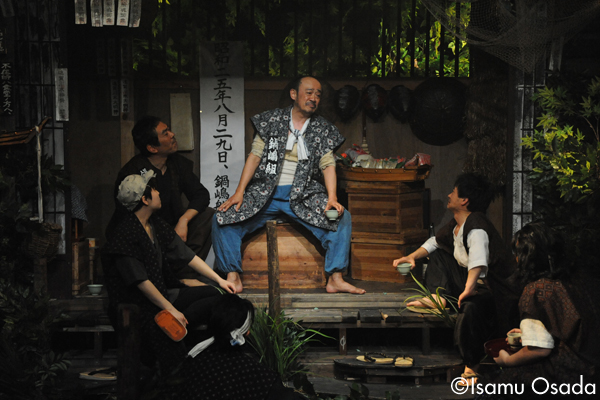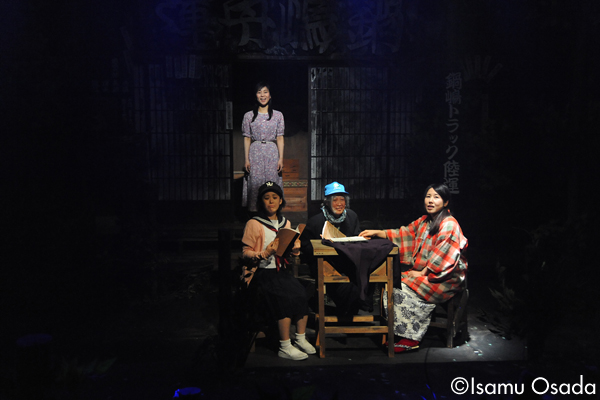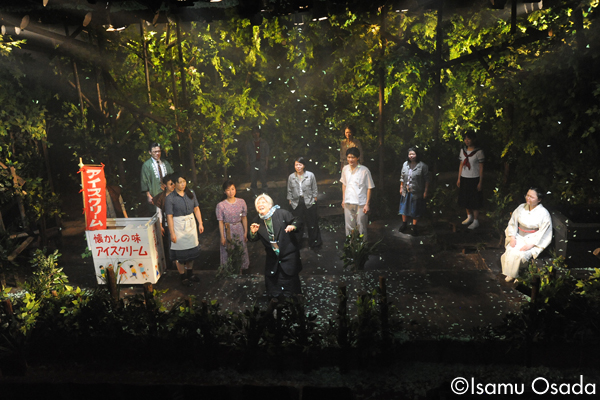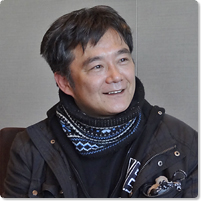Prologue. The setting is summer in the present. In a park near the Onga River there is an old woman selling ice cream from the old cart she pulls. With all her pocket money gone and at a loss for what to do, the old woman speaks to the crying cicadas about memories of the past.
It is spring of the year 1950. The setting is a shipping company named Nabeshima Shipping founded by the boss Rokube Nabeshima (nicknamed Naberoku) and a group of ruffian sailors he has gathered. In the Nabeshima household there are three daughters (Ichiho, Nao and Terumi), and also living with the family is one of the company employees Chuji Nozuka and his wife Mune and the company’s boat skipper Senzo Urasaki. Angered by the fact that her father Naberoku had hurt a man she liked, Ichiho stabs Naberoku.
Stepping in to break up the fight between the father and daughter is Naberoku’s old friend Kamekichi. She is the president of the company Doigaki Meimeido that does a variety of business along the lower stretches of the river and she has come to offer that Naberoku join in some business they hope will be fruitful when special procurement orders start coming in as a result of the Korean War. As they talk, something moves in the box Naberoku is carrying on his back. Out of the box comes a five-year-old girl named Orie (later to be the “old woman” in the story). She is Naberoku’s illegitimate child by a woman he had been seeing on the side.
Act 1. It is summer of the same year. Everyone at Nabeshima Shipping is busy preparing for a banquet. Kamekichi and her employee Inamori have joined in. Mune is telling the solitary Orie that cicadas are the reincarnations of people and that if you give then a funeral ceremony a golden cicada will appear and bring you profit.
At the banquet, the conversation is brightened by good news about the prospects of the company’s trucking department that Ichiho has taken charge of and the cafeteria that Nao has started after marrying Senzo, When the conversation turns to the American soldier that they have started doing business together with, Terumi suddenly tenses up, trembling as with fear.
The scene shifts from 1950 to the present. The old woman (Orie) continues talking to the cicadas, this time about her memories of the big typhoon of 1953, and then they shift to the time when business was beginning to go bad for Nabeshima Shipping.
The year 1953. The Onga River was about to overflow. While the adults are busy making preparations to evacuate the threatened riverside are, the child Orie is chasing a cicada that only she can see. Nao is injured when she tries to protect Orie from some flying pieces of wood that the typhoon winds have blown loose.
All of the Nabeshima boats have been blown loose and drifted away, and Nao’s injuries have caused her to lose her child to a miscarriage. Boats are the lifeline for the shipping company, and Naberoku tries to borrow money from Kamekichi to buy boats to replace those that have been lost, but Kamekichi refuses, saying that [small-scale] shipping is a thing of the past.
Taking the opportunity of her miscarriage, Nao says she is going to divorce the poorly behaved Senzo. Terumi has found the old gramophone that her mother used to listen to and puts on a recording of “Memories of Alhambra.” The three sisters begin to talk deeply in the nostalgic atmosphere. It is now the summer of 1960. Orie is now a middle school student. The shipping business is in decline, but the trucking business Ichiho is heading and Nao’s cafeteria are doing well, the latter thanks to the popularity of an original flavor of ice cream Nao has created. The Doigaki Meimeido company has started a new business with a school that gives music lessons, and the new Nabeshima employee and Kurahashi and Inamori come to Rokube with a new business offer using their boats as an on-water stage for jazz bands performing as publicity attractions.
However, by now Naberoku’s shipping business has deteriorated to the point where he is renting out the boats to women as places of prostitution. Naberoku goes into a tantrum when his attempt to raise the rental rate fail, and in his rage he unwittingly smashes the record that Terumi had loved so much. In the course of the uproar, Nao collapses. Nao had been concealing the fact that she is ill.
Inamori, who is fond of Terumi, invites her to go out to a movie with him, but she declines. She is singing to Orie a song she calls “Song of the Cicada” that she has written by putting words to the music of
Memories of Alhambra
.
Act 2. The setting shifts to the present. The old woman talks about the end of the summer of when everything seemed to go downhill in a bad way.
Kamekichi, who has come for business talks with Naberoku, announces that he plans to adopt Kurahashi and make him heir to his business and that he wants to ask for Orie’s hand in marriage as Kurahashi’s wife. Both Naberoku and Kurahashi object to the idea.
A month later. Business is not going well for the trucking business due to tough competition, and the cafeteria is suffering from chronic understaffing. When Kamekichi offered to help put Orie through high school, Ichiho refuses and tells her that she will put Orie through high school on her own. But, the strain of overwork in a struggling business led Ichiho to a dependency on methamphetamine, and it was Naberoku, driven by a thirst for money, who had supplied her with the drug.
Orie had applied herself diligently to study for the high school entrance exams. Kurahashi, who had initially been opposed to the idea of marrying her has had a change of heart and there is a favorable mood between the two. Meanwhile, Nao, whose illness has worsened, is no longer seen at the cafeteria. Now effectively out of work, Naberoku lives aboard one of his boats.
Having made up his mind, Inamori tells Terumi his decision. Terumi has gotten up the courage to confess to him that she had been raped by American soldiers the year the War ended, but Inamori finds himself unable to live with the fact, and he leaves her. Utterly disheartened, Terumi tries to take her own life.
At the hospital where Terumi is on the brink of death, everyone has gathered, and suddenly Inamori appears and gradually reveals the truth of what happened. Enraged, Naberoku and Ichiho begin to beat him. Just then, the news comes that Terumi will survive.
Relieved and recovered from her fit of anger, Ichiho picks herself up and drags her tired body out the door to return to the trucking office work that waits for her. Moments later there is a screech of brakes and the noise of a collision. Seeing Naberoku’s ridiculing laugh at the news that Ichiho has just died, Orie grabs a kitchen knife and stabs him and then runs off. The truth is that Kamekichi is Naberoku’s wife who repents the fact that she left his home, leaving her three daughters behind. Walking off toward the river without a word, Naberoku is never heard of again.
The setting returns to the present. The old woman who has been telling her thoughts to the cicadas appears on stage with the young Orie.
It is early spring in 1961. Weakened and gaunt from her illness, Nao knows she has not long to live and has decided too give the recipe for her ice cream and other memoires to her younger sister (the two Orie, young and old). As for Terumi, who has received the offer of marriage from Inamori, disappears leaving only the words that she wants to disappear while she is still happy.
The year is 1964, the year of the Tokyo Olympics. Alone now, Orie has graduated from high school and has become an employee of the Meimeido company, the only remaining of business of which is making music boxes. The Nabeshima house has now become a property that will be torn down for a rezoning project and all the people once associated with it are gone.
Kamekichi gives Orie a music box that plays
Memories of Alhambra
. Orie realizes for the first time that Kamekichi is the mother of her three older sisters. She says happily that when she can save up enough money, she will start an ice cream shop using Nao’s recipe.
The time setting changes to the present. Around the old woman, now stricken with illness and nearing her end, a group of old nostalgic faces (those who have passed away) has gathered and are singing with vigor for her the Song of the Cicada. Roused by the singing, she shouts out the call of the ice cream seller and begins to walk off again on her rounds, embraced in the warm applause of the ghosts from her past.





